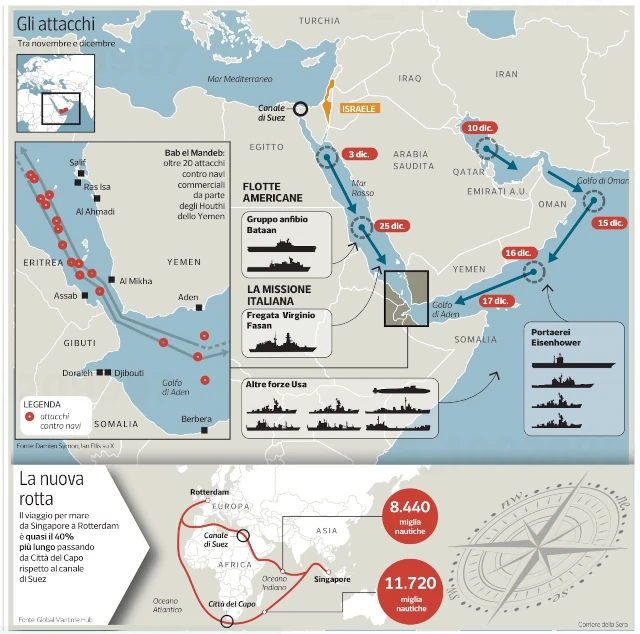Brush bristles and mixtures of natural bristles and synthetic filaments from China and India will experience delivery delays...
There is also a problem in the area of brush bristles from China, the Suez Canal, which connects the Mediterranean Sea with the Red Sea, is one of the most important trade routes in the world. However, the current war situation has created navigation difficulties for merchant ships passing through the canal.
Corriere della sera, 3 January 2024: Danish shipping group Maersk is the second largest merchant ship owner in the world behind Msc.
Danish shipping giant Maersk suspends all maritime transits through the Red Sea after one of its ships was attacked by Houthi militants at the weekend.
According to TG24, ships refuse to transit the Suez Canal because they fear possible military attacks by the Houthis as a result of the conflict in the Middle East. As a result, the new routes plan to circumnavigate Africa taking 10 days longer to sail at a significantly higher transit cost. In addition, Houthi attacks on merchant ships in the Red Sea area are leading several companies to divert ships.
While the Post points out that more than a hundred merchant ships that were supposed to cross the Suez Canal to reach the Mediterranean Sea from the Red Sea or vice versa have been diverted due to the risk of Houthi attacks.
The situation in the waters of the Red Sea is of international concern precisely because it is an important hub of world trade. Attacks in the last month have mainly occurred between the Straits of Djibouti and Yemen, have been missile attacks, and are leading several companies to divert ships.
The new routes, to avoid encountering the Yemeni armed group, therefore avoid the Red Sea route and then the Suez Canal, a route that allows a ship to go from Rotterdam to Singapore in about 26 days. Instead, they choose to circumnavigate Africa by extending the sailing time by ten days, again to go from Rotterdam to Singapore: in this case it takes 36 days.
Ten extra days, in global trade, adding up all the thousands of ships that have to choose this route loaded with containers on board, translates into billions in costs for the global economy.


